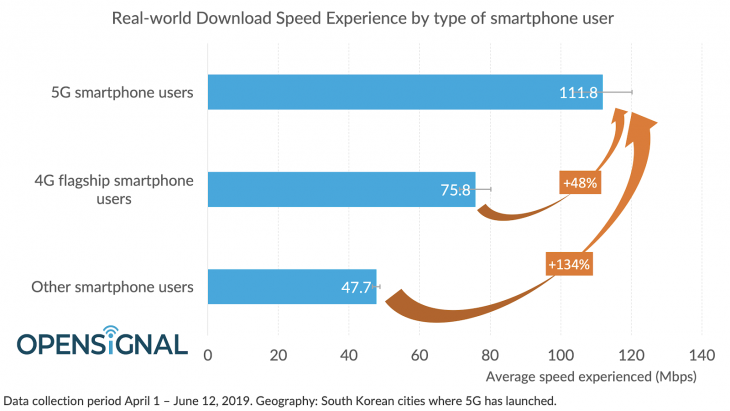
INDEPENDENT ANALYTICS FIRM Opensignal today released a new report which analyzed 5G network and smartphone performance in Korea, the world’s earliest adopter of the new wireless standard.
The company’s research shows the average real-world download speed of 5G smartphone owners is 111.8 Mbps – or 48% faster – than users with comparable recent 4G flagship smartphones, and 134% higher than other 4G smartphone users.
“However, the maximum speed experienced by 5G smartphone users is much faster than the average download speed. For example in the U.S., Opensignal users have experienced maximum speeds as high as 1.2 Gbps measured against normal content delivery networks, not special test servers,” says the OpenSignal blog post. “By contrast, in South Korea the maximum speed we have seen to date is 988 Mbps, which is 8.8 times as fast as users’ average real-world speeds of 111.8 Mbps.
“Given the speeds experienced in Korean cities were already fast on 4G, this early 5G launch should extend Korea’s leading global position.”
However, “while there is a significant increase in the average download speeds experienced by 5G smartphone users, both upload speeds and latency — a measure of the responsiveness of the network — are similar between 4G smartphone users and 5G smartphone users. This upload and latency finding is what Opensignal would expect at this early stage of the 5G era because initial 5G technology does not yet seek to improve either characteristic,” reads the report.
These metrics will improve as 5G becomes more mainstream and the early 5G technology matures over the coming  months, however.
months, however.
Besides, explains Opensignal “at the moment, 5G smartphone users connect to both a 4G spectrum band and a 5G New Radio (NR) band simultaneously in what is called Non-Standalone Access mode. Effectively the system is using 5G for raw download bandwidth, but uses 4G for other network functions.”


